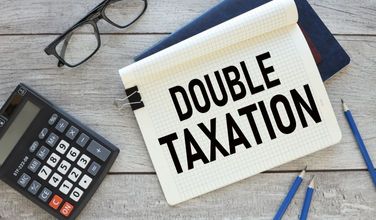Corporate Tax Exemption in Singapore: A Complete Guide to Optimise Your Business
- Modified: 16 April 2025
- 11 min read
- Tax & GST, Bookkeeping


Heather Cameron
Author
From expert guidance and helpful accounting tips to insights on the latest trends in fintech, Heather is here to empower entrepreneurs and small business owners in Singapore with great content. With a background in digital marketing spanning eight years, she has experience writing for various industries and audiences. As Osome’s copywriter, she’s here to inform and inspire our readers with great storytelling.

Imran Marican
Reviewer
Imran Marican, ATA SCTP member, is our Corporate Tax Assistant Manager based in Singapore, with almost a decade of experience in Singapore corporate tax. With in-depth knowledge of Singapore corporate tax law and regulations, he can help with corporate tax compliance that matters to every company. While our business writers transform complicated tax jargon into easy-to-understand concepts, as a reviewer for the Osome blog, Imran ensures our content is accurate and relevant, helping our readers boost their businesses with helpful tips and insights.
Curious about how the corporate tax exemption schemes in Singapore can benefit your business? This article outlines all the key schemes, including Start-Up Tax Exemption and Partial Tax Exemption, to help you lower your corporate tax obligations and foster business growth.
Key Takeaways
- Start-Up Tax Exemption (SUTE) and Partial Tax Exemption (PTE) are both exemption schemes in Singapore that can help reduce the financial burden for businesses.
- The SUTE provides significant tax relief to qualifying new companies, allowing them to reinvest profits for growth, with exemptions on their initial S$ 100,000 of chargeable income.
- Effective management of tax obligations, including understanding exemption eligibility and maintaining detailed records, is crucial for businesses to optimise their tax positions and ensure compliance.
Understanding Singapore Corporate Tax Exemption
Singapore’s corporate tax system offers various exemption schemes and tax incentive schemes for businesses to encourage investment and innovation. These schemes can significantly reduce corporate income tax, making it easier for companies to reinvest profits into their growth. This competitive edge is further sharpened by the PTE and SUTE, which provide substantial relief to qualifying companies, especially in managing Singapore corporate taxes.
Stay compliant and maximise tax benefits with Osome’s expert accounting services. We handle bookkeeping, tax filings, and financial reports, ensuring your business meets all regulatory requirements while optimising its tax position.
The real charm of Singapore’s corporate tax rate and exemption schemes is their potential to lower the effective Singapore corporate tax rate well below the headline tax rate, making Singapore an extremely attractive destination for businesses seeking a favourable tax environment. Also, certain payments made to non-resident companies are exempt from corporate tax.
Start-Up Tax Exemption (SUTE)
Introduced in 2005 by the Inland Revenue Authority, the Start-Up Tax Exemption (SUTE) scheme is a lifeline for newly incorporated companies in Singapore. This scheme is designed to alleviate the initial financial burdens many start-ups face, thus fostering an environment where new ventures can flourish.
SUTE offers new start-up companies substantial exemptions on their initial earnings. Qualification depends on meeting specific criteria and understanding the associated benefits.
Eligibility criteria for SUTE
To unlock the benefits of the SUTE, a company must meet several key criteria:
- It must be registered as a private limited company in Singapore.
- It has to be a Singapore tax resident company.
- It must not be an investment holding/other holding company or undertake property development for sale/investment of both, meaning that rental income is not eligible.
- The startup should have a maximum of 20 shareholders.
- At least one individual shareholder must hold no less than 10% of the shares.
Benefits of SUTE
For the first three assessment years, qualifying startups receive a full exemption on their initial S$ 100,000 of chargeable income, allowing them to reinvest earnings into growth and development.
Moreover, the scheme offers a 50% exemption on the next S$ 100,000 of chargeable income. Over the three-year period, startups can benefit from a total maximum exemption of up to S$ 125,000.
Partial Tax Exemption Scheme (PTE)
For businesses that do not qualify for the SUTE, the PTE scheme allows companies to exempt 75% of the first S$ 10,000 of chargeable income and 50% of the next S$ 190,000, providing significant tax relief. A company's maximum exemption under the PTE scheme is S$ 102,500 per Year of Assessment.
The PTE scheme is designed to support a broader range of businesses, ensuring that even those that have outgrown the start-up phase or did not meet the SUTE criteria can still enjoy substantial tax savings. Companies that enjoy the SUTE for the first 3 years will be given the PTE on the 4th year and subsequent years till the cessation of the company. This flexibility makes the PTE scheme a cornerstone of Singapore’s corporate tax strategy, enabling companies to thrive and grow.
Foreign Sourced Income Exemption (FSIE)
Introduced on 1st June 2003, the FSIE scheme is a crucial tool for companies with international operations. Only Singapore tax resident companies can enjoy this exemption. This scheme aims to prevent double taxation on foreign income, making global expansion more feasible for Singapore-based businesses. To qualify for the FSIE, the foreign income must have been taxed in a jurisdiction that has a Double Taxation Agreement (DTA) with Singapore.
Companies must submit relevant documentation, including Form C and the Appendix for Additional Information on Income and Deduction (Form IRIN 301), and maintain these records for five years.
The FSIE covers specified foreign-sourced income, such as dividends, foreign branch profits, and foreign-sourced service income. This exemption prevents the same income from being taxed twice as long as the taxing jurisdiction holds a DTA with Singapore.
Incentives for Innovation and Expansion
Singapore’s commitment to fostering business innovation and growth is evident through various tax incentives aimed at encouraging companies to invest in new technologies and expand their operations. The Pioneer Certificate Incentive (PC) and Development and Expansion Incentive (DEI) are key programs designed to attract businesses that can contribute significantly to the local economy.
These incentives are part of a broader strategy to enhance Singapore’s industrial capabilities and stimulate economic growth through innovation. The Refundable Investment Credit, for instance, was introduced to drive investments by offering incentives of up to 50% on qualifying expenses. To qualify for these incentives, a company must apply to the EDB itself for all of these schemes except EIS.
Incentive Program | Description |
|---|---|
| 🚀 Enterprise Innovation Scheme (EIS) | Supports businesses in innovation with tax deductions and cash payouts based on eligible expenses. |
| 🏆 Pioneer Certificate Incentive (PC) | Encourages firms using advanced technologies by offering reduced Singapore corporate tax rates for significant investments. |
| 📈 Development & Expansion Incentive (DEI) | Helps businesses expand operations with tax benefits for contributing to Singapore’s industrial growth. |
| 💰 Refundable Investment Credit | Provides incentives of up to 50% on qualifying expenses to drive business investments. |
Let’s explore these incentives in more detail.
Enterprise Innovation Scheme (EIS)
The Enterprise Innovation Scheme (EIS) is tailored to support businesses in their innovation endeavors. Companies that qualify for the EIS can benefit from generous deductions on eligible expenses and cash payouts based on qualifying spending at a conversion rate of 20%.
To qualify for the EIS Scheme, businesses must demonstrate a strong commitment to innovation and meet specific criteria set by the authorities. Participants can convert qualifying expenses incurred via R&D activities into a cash payout, making it easier for businesses to fund more R&D initiatives.
Pioneer Certificate Incentive (PC) and Development and Expansion Incentive (DEI)
PC and DEI incentives are pivotal in supporting innovation and business growth in Singapore. These programs aim to attract investments that enhance the country’s industrial capabilities, particularly from firms utilising new technologies or contributing significantly to the local economy.
Participating in the PC and DEI programs reduces Singapore corporate tax rates and encourages further innovation and expansion.
Incentives for the Financial Sector
Singapore also offers incentives to support financial institutions with market expansion plans in Singapore. These unique tax treatments are designed to attract financial institutions, such as investment holding companies, to expand their operations in Singapore. As a result, Singapore businesses can benefit from having more financing and banking opportunities.
Only Singapore resident companies qualify for these incentives, attracting companies expanding overseas to consider establishing a permanent branch in the local market.
Financial Sector Incentive (FSI) Scheme
The FSI Scheme benefits licensed financial institutions, such as licensed banks, wealth management firms, and trading companies. The scheme allows income derived from certain high-growth, high-value-added activities to enjoy a tax rate of 5%, whereas broader financial activities qualify for a 13.5% corporate income tax rate.
Insurance Business Development (IBD) Scheme
The IBD Scheme offers a 10% concessionary tax rate for qualifying service income made by life, general, and composite insurance companies. The tax rate also covers income arising from insurance broking and advisory service provisions.
Finance and Treasury Centre (FTC)
Taxable income derived by an FTC via approved activities receives a reduced tax rate of 8% or 10%. These activities include international treasury and fund management activities, credit control, financial advisory services, and more.
Tax Reliefs and Rebates
Singapore offers a range of tax reliefs and rebates designed to ease the tax burden on businesses. Same as the other grants, the company has to apply for this with EDB. Another notable relief is the Refundable Investment Credit, which allows businesses to claim tax credits on qualifying investments, effectively reducing their income tax liabilities. Additionally, certain charitable donations can yield significant tax deductions, enhancing overall tax efficiency.
Corporate income tax rebate
In 2024, all taxpaying companies in Singapore can benefit from a corporate income tax rebate, which provides a 50% reduction on their Singapore income tax, capped at $40,000 for the Year of Assessment. The reduced amount is then paid back to the company through a CIT rebate cash grant, allowing businesses to reinvest the savings into their operations.
Refundable Investment Credit (RIC)
The Refundable Investment Credit (RIC) aims to encourage investment in Singapore by offering a tax credit that can be offset against a company’s Singapore tax payable amount. Businesses become tax-exempt on qualifying expenditures, subject to specific caps. Additionally, eligible businesses can convert these qualifying expenditures into a non-taxable cash payout.
The RIC Scheme awards companies with credits that can be applied to their Singapore corporate tax when they pay taxes and also provides new exemption categories for qualifying businesses. It also allows companies to convert qualifying expenses into cash to be reinvested into the business.
Filing Corporate Income Tax Returns
Filing corporate income tax returns is a critical compliance requirement for businesses operating in Singapore. Companies must file their tax returns electronically through the MyTax Portal, ensuring that all financial records are complete and accurate.
A certified tax advisor can enhance compliance and optimise tax positions, aiding businesses in navigating Singapore’s complex tax system.
Filing requirements and deadlines
In Singapore, the deadline for filing corporate income tax returns is November 30 each year. Companies must file Form C/C-S/C-S Lite by this date for the relevant assessment year.
Additionally, the Estimated Tax Return is due within three months before the financial year ends.
Preparing form C-S/C
Form C-S Lite is available for small companies with annual revenue not exceeding SGD 200,000, simplifying the corporate tax filing process for these businesses. Proper documentation of expenses is vital to substantiate claims during tax assessments, ensuring that businesses maximise their tax deductions.
Tax Residency and Its Impact
A company’s tax residency status in Singapore is determined based on where its strategic decisions are made and by whom. This status significantly affects the type of exemptions a company can receive, particularly regarding foreign-sourced income.
Aspect | Details |
|---|---|
| 🏢 Tax Residency Determination | A company is a tax resident if strategic decisions, including board meetings, occur in Singapore.🔄 |
| 🎯 Impact of Tax Residency | Determines eligibility for exemptions, especially on foreign-sourced income.🔍 |
| 💡 Key Benefits | Exemptions on foreign-sourced income. Access to 90+ double tax agreements to prevent double taxation.🌍 |
Determining tax residency
A resident company makes its management decisions within Singapore, including the location of board meetings and the presence of decision-making directors.
Establishing residency for tax purposes in Singapore is essential for companies to comply with regulations and maximise their eligibility for exemptions.
Benefits of being a tax resident
Being a tax resident in Singapore comes with significant benefits, including exemptions on foreign-sourced income. Additionally, tax resident companies have access to over 90 double tax avoidance agreements, which provide relief from double taxation and reduce overall liabilities.
Leveraging Double Taxation Agreements (DTAs)
Double Taxation Avoidance Agreements (DTAs) prevent companies operating across borders from being taxed twice on the same income. They allow Singapore tax resident companies to benefit from exemptions for foreign income tax when income has been taxed in a jurisdiction with a DTA, reducing overall corporate tax and enabling reinvestment into business operations, including the possibility of a double tax deduction.
Additionally, DTAs provide reduced withholding tax rates and allow companies to access a Certificate of Residence, facilitating tax relief in foreign jurisdictions. By leveraging these agreements, companies can optimise their tax positions and ensure compliance with international tax regulations.
Managing Tax Obligations Efficiently
Understanding Singapore’s tax incentives and reliefs can optimise a company’s tax position. Companies need to submit the Estimated Chargeable Income (ECI) and Form C/C-S/C-S Lite as part of their tax returns. Avoiding last-minute tax payments and maintaining detailed records can prevent potential complications and ensure compliance.
Eligible companies, especially those employing at least one local employee, can benefit from a guaranteed cash grant as part of the corporate income tax rebate, which includes a $2,000 cash grant. By proactively managing their obligations, businesses can take full advantage of the available tax incentives, avoid tax evasion charges, and support their growth and innovation efforts.
Estimating chargeable income
Estimating chargeable income is a critical task that businesses must complete within three months after the company's financial year ends. To accurately forecast chargeable income, companies need to consider their total revenue and apply any eligible deductions or exemptions, including the company’s income tax payable.
Deduct the allowable business expenses from net profits to estimate the company's chargeable income. This number helps a company plan for corporate tax and withholding tax liabilities by forecasting the company's taxable income per year of assessment, making it more predictable when it's time to pay taxes.
Deductible business expenses
In Singapore, certain business expenses can be deducted to reduce taxable income. These include:
- Operating costs
- Employee salaries
- Rent
- Professional fees
- Utilities
An expense qualifies as deductible only if it is incurred entirely and solely for generating income derived. This ensures that the expense is directly related to income production.
Keeping detailed records of all income and expenses is essential to support expense claims and maximise tax deductions, thereby reducing overall tax liabilities.
Maximise your tax efficiency with Osome’s expert accounting services—our team ensures your business expenses are properly recorded and deducted. Let us help you reduce taxable income while staying fully compliant with Singapore’s regulations. Contact us today!
Summary
Understanding and leveraging corporate tax exemptions and incentives in Singapore can significantly reduce a company’s corporate tax and enhance its financial health. Core schemes and incentives include the Start-Up Tax Exemption (SUTE) and Partial Tax Exemption (PTE), specialised foreign tax credits like the FSIE, various incentives supporting innovation and expansion, and incentives for the financial industry. By ensuring compliance with Inland Revenue Authority (IRA) requirements, maintaining accurate records, and strategically planning for tax residency, companies can fully benefit from Singapore’s business-friendly tax environment. Embrace these opportunities to foster growth, innovation, and long-term success.






